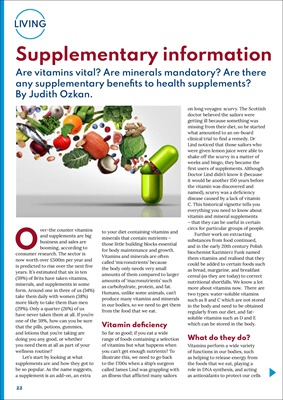
22
LIVING making carbs count
Supplementary information
Are vitamins vital? Are minerals mandatory? Are there
any supplementary benefits to health supplements?
By Judith Ozkan.
O
ver-the counter vitamins
and supplements are big
business and sales are
booming, according to
consumer research. The sector is
now worth over £500m per year and
is predicted to rise over the next five
years. It's estimated that six in ten
(59%) of Brits have taken vitamins,
minerals, and supplements in some
form. Around one in three of us (34%)
take them daily with women (38%)
more likely to take them than men
(29%). Only a quarter (26%) of us
have never taken them at all. If you're
one of the 59%, how can you be sure
that the pills, potions, gummies, and
lotions that you're taking are doing
you any good, or whether you need
them at all as part of your wellness
routine?
Let's start by looking at what
supplements are and how they got to
be so popular. As the name suggests,
a supplement is an add-on, an extra
to your diet containing vitamins and
minerals that contain nutrients -
those little building blocks essential
for body maintenance and growth.
Vitamins and minerals are often
called 'micronutrients' because
the body only needs very small
amounts of them compared to larger
amounts of 'macronutrients' such
as carbohydrate, protein, and fat.
Humans, unlike some animals, can't
produce many vitamins and minerals
in our bodies, so we need to get them
from the food that we eat.
Vitamin deficiency
So far so good; if you eat a wide
range of foods containing a selection
of vitamins but what happens when
you can't get enough nutrients? To
illustrate this, we need to go back
to the 1700s when a ship's surgeon
called James Lind was grappling with
an illness that afflicted many sailors
on long voyages: scurvy. The Scottish
doctor believed the sailors were
getting ill because something was
missing from their diet, so he started
what amounted to an on-board
clinical trial to find a remedy. Dr
Lind noticed that those sailors who
were given lemon juice were able to
shake off the scurvy in a matter of
weeks and bingo, they became the
first users of supplements. Although
Doctor Lind didn't know it (because
it would be another 150 years before
the vitamin was discovered and
named), scurvy was a deficiency
disease caused by a lack of vitamin
C. This historical vignette tells you
everything you need to know about
vitamin and mineral supplements
- that they can be useful in certain
circumstances for particular groups
of people.
Further work on extracting
substances from food continued,
and in the early 20th century Polish
biochemist Kazimierz Funk named
them vitamins and realised that they
could be added to certain foods such
as bread, margarine, and breakfast
cereal (as they are today) to correct
nutritional shortfalls. We know a lot
more about vitamins now. There are
two types: water-soluble vitamins
such as B and C which are not stored
in the body and need to be obtained
regularly from our diet, and fatsoluble vitamins
such as D and E
which can be stored in the body.
What do they do?
Vitamins perform a wide variety
of functions in our bodies, such
as helping to release energy from
the foods that we eat, playing a